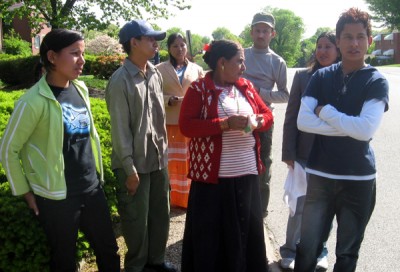Bhutanese Family in Pittsburgh: “We were like birds with nowhere to land.”
by Olivia Stransky / August 9, 2011 / 1 Comment
This month Sampsonia Way’s editorial intern Olivia Stransky met with the Odari family to get an update on how the family is adjusting to life in Pittsburgh and hear how they feel about the situation in Nepal’s refugee camps now.
The Odari family lives in Prospect Park, an area in the borough of Whitehall. There is a strong sense of community in the neighborhood. As I walked to the Odari’s apartment, I saw people of all kinds of nationalities mingling on their porches and sidewalks. Various delicious smells wafted out of the propped-open doors of apartments, and playful children ran in and out of the buildings.
The Odari family is large, and Pittsburgh seems to be agreeing with them. The patriarch of the family, Bhawani Prasad, is now fifty-six, his wife Lachhi Devi is fifty-five. Meena Kumari, their youngest daughter, is now twenty-four, and her brother Dilli Prasad is twenty-three . Yadu Timsina, the husband of Durga Devi, also joined in the conversation.
Though most of the family has come to Pittsburgh, before the interview the Odaris received word that Bhawani Prasad’s father had passed away in Nepal. Despite the sad news, there was still an air of optimism in the room. As we talked, a baby was fondly passed around. Unlike her parents, aunts, uncles, and grandparents, this little girl will never have to know what it is like to live in a refugee camp for eighteen years, being repeatedly denied citizenship.
How has the Pittsburgh’s Lhotshampa community changed in the past three years?
Meena Kumari: There are over 150 refugees from Nepal in Pittsburgh now. It is a very big population. We were the first refugee family; that’s why everyone here knows the Odari family. Catholic Charities had contacted Deepak [Adhikari] before and now Deepak knows our family very well.
Are there a lot of refugees from other countries in Whitehall?
Meena Kumari: There are Burmese, Africans, Bosnians, and Vietnamese.
Dilli Prasad: Almost everyone in our apartment building here in Whitehall is a refugee.
Meena Kumari: Some refugees moved to Georgia, California, and New York City, but living here is good because those other places are too expensive for us.
Do you help new refugees often?
Bhawani Prasad: If you have just arrived from Nepal, I’ll help you with going to crucial places like the bank, the hospital, and shopping complexes.
You told Deepak Adhikari about the difficulties of getting a job…
Yadu Timsina: It is very hard to get job if you are non-English speaking, and without a job it’s very hard to pay rent.
Does Catholic Charities provide English classes?
Meena Kumari: There is an ESL class for the illiterate. Also the family center here in Whitehall offers classes.
Yadu Timsina: People are taking classes, but in Bhutan they didn’t learn how to read and write. Some of the refugees can read Nepali but English is very difficult. Because of that it is harder for them to get jobs.
How old you were each of you when you left Bhutan?
Dilli Prasad: I was one year old when I left Bhutan.
Yadu Timsina; I was around nine when we left Bhutan. I remember the area I grew up in. Even though I was a little guy I used to walk around a lot and visit my friends and family at their homes.
Meena Kumari: I was three years old. I don’t remember Bhutan, but I remember the refugee camps. First we lived in Maida for six months but there were too many people, too many deaths. That’s why we moved again.
Bhawani Prasad: I was thirty-four when we left.
What had you been doing in Bhutan?
Bhawani Prasad: I was a farmer, but the government took my property.
Yadu Timsina: The family had owned a lot of land, but it’s all the government’s now.
How much did you understand about having to leave?
Yadu Timsina: I knew that the government evicted us from Bhutan. They were putting people in jail without reason. What I understood was that they were going to punish us and put us in jail. Most people chose to leave instead of going to jail.
Did you think you were going to go back?
Yadu Timsina: I thought it was temporary, that we would go home in a few years. But that wasn’t the case. Now I don’t want to go back to Bhutan because when I was small I was forced to leave . The night we left it was very stormy so we had to sleep under a tree. When I remember that I don’t want to go back to Bhutan.
Bhawani Prasad: We stayed in Nepal for eighteen years, trying to go back to Bhutan, but none of the governments helped us return. We had to leave a lot of property in Bhutan. If the government welcomed us back then I would go; Bhutan is where I was born.
Yadu Timsina: In the camp we were living under a thatched roof. We thought we would get a better life if we moved to a new country. We lived in Nepal but we were like birds flying in the air with nowhere to land. We weren’t allowed to have anything in Nepal; we were bound by certain laws over there because we were refugees. We moved because they treated us differently.
Are you still in contact with anyone in the camp? Has anything changed?
Dilli Prasad: Things over there are still very bad.
Bhawani Prasad: Nothing’s changed.






One Comment on "Bhutanese Family in Pittsburgh: “We were like birds with nowhere to land.”"
Trackbacks for this post